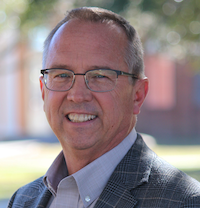Richard Elligson
Richard Elligson earned a PhD in Theology from Mid-America Baptist Theological Seminary. Archives

Richard Elligson earned a PhD in Theology from Mid-America Baptist Theological Seminary. Archives
Session 4
May 5, 2024
WORSHIPING GOD
Psalm 34:1-3; 8-10; 15-18
I have always believed and taught that there are five major functions of the church: (1) worship, (2) missions/evangelism, (3) discipleship, (4) ministry, and (5) fellowship. And while all are essential elements of a healthy and vibrant church, none is more important than worship. In fact, I always said if we gather together on Sunday morning and fail to worship, we have failed as a church! Psalm 34 is a psalm of deliverance, penned by David. In it, three worship themes are highlighted.
Praise (vv. 1-3). Praise is the cornerstone of worship. By its very nature, praise consists of exalting the Lord while humbling the believer. There are three words in the Old Testament translated as praise. All three connote honor and thanksgiving; and all three underscore the worthiness of the recipient. In these first verses, three aspects of praise are mentioned. First, there is continuity. David said he would praise the Lord “at all times,” and that praise would “always be” on his lips (v. 1). Second, there is humility. Interestingly, the word “boast” has the same root as the word hallelujah. So, to “boast in the Lord” doesn’t imply some kind of arrogant bragging, but rather a humble exaltation that points all attention to the Lord. Notice the positive vibe of his praise as well. Those of like mind will hear his praise and rejoice in it (v. 2). Third, there is community. Proclaiming the Lord’s greatness is the essence of praise, but here David invites the congregation to join in (v. 3). While solitary praise is certainly a part of our quiet, personal devotion, exaltation is multiplied when other voices join the choir. For reflection: Think about the whole “praise chorus” phenomenon in our churches. Do you think praise teams and praise bands enhance our worship? Do they ever distract from it? How do you decide?
Provision (vv. 8-10). Few phrases capture the senses better than this: “Taste and see that the Lord is good!” While verse 3 invites the congregation to give Him praise, verse 8 invites the congregation to receive of His goodness. To taste is to sample it; to try it out. There is great confidence here. David, a man after God’s own heart, had experienced the Lord’s bounty and he invites others to come beside him. In Him, they will find refuge (v. 8). The word translated “refuge” is literally the word “trust.” The idea here is confidence. Blessed in the one who is fully dependent upon Him; in Him, there is security. Those who revere Him are rewarded by Him. Literally, they “lack nothing.” The illustration that follows is dramatic. Even lions that are young and strong find themselves hungry at times! But those who pursue the things of God will never lack that which is good (see James 1:17). For reflection: The words “fear” and “seek” have prominent positions in these verses. How does one fear the Lord and still seek Him?
Compassion (vv. 15-18). The third element of worship is compassion. Notice the features of the Lord turned towards man. His eyes are vigilantly watching the righteous; and His ears are trained towards us lest some evil threaten us (v. 15). To “set one’s face against,” is to confront head-on. David knew no warrior would dare turn his back on the enemy. Here, the Lord is confronting the threat of evil face on, with the intent that the wicked, all their ancestors, and all their influence be obliterated from memory (see Ps. 109:13). Verses 17 and 18 are set in startling contrast to the harshness of those before. With the same intensity that he punishes the wicked, He will deliver the righteous! With the same passion He judges the proud, He will bind up the brokenhearted and save those who are crushed in spirit. For reflection: Look up Jesus’ pronouncement in Luke 4:18-19. How does this portrait of Christ fit into our discussion?
Session 3
April 28, 2024
GROWING IN CHRIST
Colossians 1:9-14; 21-29
Colossians is an interesting book. Written from prison to a church he had never met, Paul authored the letter in response to some Christological issues the church was facing. Apparently, some there were doubting the deity of Christ, and therefore calling into question the whole redemption He offered. The apostle Paul used the opportunity to exalt the Lord Jesus Himself, and to expose the glory of His blood-bought church. In order to do so, Paul began by explaining his role in the church and his dedication to spreading the Good News. In this week’s lesson, he makes three key points.
Praying for good things (vv. 9-14). The verses preceding our text commend the church at Colossae for the three greatest and most enduring characteristics of Christ’s body: faith (v. 4), hope (v. 5), and love (vv. 4, 8). With such a firm foundation, it was easy for Paul to both encourage them and to pray for them. Notice the important mix of understanding and practice. These two essentials provide the basis of spiritual growth. Specifically, Paul prays that they might be filled (literally “crammed full”) with the knowledge of His will, all wisdom, and spiritual understanding (v. 9). Why? So they might continue to walk in a way worthy of the Lord; that is, live an intentional life that pleases Him by bearing fruit, demonstrating good works, and growing in the knowledge of God. Beyond spiritual understanding, Paul prays that the church might have spiritual strength as well. Notice the increasing combination of words he used: that they might be “strengthened with power,” “according to His might.” The most surprising part of Paul’s prayer is not that they might be strengthened to perform mighty deeds or work miracles, but rather that they might be strengthened to endure; and to do so with patience, joy (v. 11), and thanksgiving (v. 12). The remaining verses in this section highlight the great blessings that accompany the difficulties, making the church’s trials worthwhile. For reflection: Look at the idea of the domain of darkness vs. the kingdom of light. What does this say about the cosmic conflict we are involved in? How central is Christ’s death in this bigger conflict? How central is the church’s role?
Prepared for good things (vv. 21-23). In verse 21, Paul reconnects with the dual themes of knowledge and behavior. But here, he uses a contrast. Once, these same believers had been separated from God and hostile towards Him. This was evident by the evil deeds they committed. A second contrast is found in verse 22: reconciliation and redemption are spiritual acts; yet Christ did those works through His physical body. A third contrast is alluded to at the end of verse 22: it was through His physical death, that we might have spiritual life. Notice the condition that Paul places on the redeemed: Christ has accomplished all these things, but they are appropriated only through steadfast and continual faith. Verse 23 is not meant to highlight Paul’s ministry of evangelism. Rather, he is stating with all humility that he, the “chief of sinners,” has been entrusted with the highest of honors: proclaiming the good news of Christ; good news that is to be preached to all of creation. For reflection: Why do you think Paul makes so much of believers’ standing before God as holy, faultless, and blameless?
Proclaiming good things (vv. 24-29). Verse 24 is particularly difficult. At first glance, it seems that Paul is somehow contributing to the sufferings of Christ! In reality, he is expanding the sufferings of Christ to include the ongoing struggles the church would face. Remember, Paul was writing this letter from prison. He recognized that any suffering he endured was in the Lord’s name and for the Lord’s church (see Phil. 3:10; see also 1 Peter 4:13). It’s interesting that in most places, Paul calls himself a “minister of God” or “minister of Christ” (Rom. 15:16). Here, his emphasis is on the church and his calling as a member of the church to complete the commission of the church: “to make God’s message fully known” (v. 25). Yes, it has been a mystery; and yes, it has been hidden. But no more! As a servant of the Lord and His church, Paul understood that his life’s calling was to advance God’s kingdom through (1) the clear proclamation of the gospel; (2) warning the lost of coming judgement; (3) teaching godly truth with godly wisdom; and (4) ensuring the spiritual maturity of believers. For reflection: Do some extra study. Why do you think the message of God was considered a “mystery?” What do you think Paul meant by saying it was “hidden?” How did all that work?
Session 2
April 21, 2024
SHARING CHRIST
Matthew 28:18-20; 2 Corinthians 5:16-21
Christ’s ascension marked the end of His earthly ministry. He is now seated at the right hand of the Father, awaiting the day of His return for the church. In the meantime, His church is charged with its own ministry: making disciples. Unlike some of the more difficult teachings of the Scriptures, the Great Commission is quite easy to understand. Jesus made it crystal clear what needed to be done and how to go about it.
The Great Commission method (Matt. 28:18-20). The Great Commission (in one form or other) is recorded in all four Gospels and again in Acts. As the final words of Jesus, the command carries tremendous weight. When Jesus said, “It is finished,” His work was done, but the church’s work was just beginning. Several key principles are expressed. The first and last phrases act as “bookends” to the commission. Verse 18 mentions His power. “All authority has been given to Me in heaven and on earth.” In this case, “All authority” means just that! Verse 20 mentions His presence. The promise “I am with you always” was a clear encouragement to His disciples then, just as it is to us today. Sandwiched between those two promises are four components of the Commission itself. First, believers are told to “Go.” Scholars have argued through the centuries whether this is an imperative (GO!) or a simple participle (“As you are going…”). Both translations are acceptable, and both are appropriate! Yes, “go!” and yes, “as you go!” Sharing the good news of Christ should be both intentional and incidental. Second, “make disciples of all nations;” not simply interested parties (as the multitudes often were), but true and dedicated followers of Christ. And not just nearby, but to the ends of the earth (see also Acts 1:8). Third, “baptizing them…” (literally, “immersing them.”). This is not a means of salvation, nor is the so-called “baptismal formula” a verbatim requirement for true baptism. But baptism was (and is) an important public proclamation of one’s commitment to Christ. In fact, in the New Testament (and in many parts of the world today), baptism acted as the profession of faith. Fourth, “teaching them to observe everything I have commanded you.” Notice especially the order: make Christ-followers, then baptize them, then teach them. For reflection: Given the clarity of the teaching, why have so many churches strayed from its simplicity, separating the profession of faith from baptism, and/or requiring doctrinal classes before agreeing to baptize?
The Great Commission message (2 Corinthians 5:16-21). Once the apostle Paul was knocked off his donkey in Acts 9, he took the Great Commission very seriously! His life was dedicated to spreading the Gospel, and his writings were dedicated to defining it and defending it. In some places (like 1 Cor. 15:1-4), his explanations are general and somewhat generic. But in others, his teachings expound on the finer points of the Gospel. This text is an example of that. The key component in this text is the doctrine of reconciliation. “Forgiveness” is one thing. It deals with the “legal debt of sin.” In other words, through Christ’s sacrificial death and our acts of repentance and faith, Christ justifies us, declaring us “not guilty.” As verse 19 says, God no longer counts our trespasses against us. That is forgiveness, and that is a wonderful thing! But there is more. Not only is the debt of sin we owed removed (not counted against us) but God makes a deposit of Christ’s righteousness into our account (v. 21). But there’s still more! Whereas forgiveness removes our debt of sin, reconciliation restores our relationship with God. We who were once “far away” from God, have been brought back close to Him (see Eph. 2:13). In other words, the ideal and original relationship for which we were created (and which sin has destroyed), has been restored by Christ. For this reason, we are new creations in Him (v. 17). So, what is the message of the Great Commission? That sinners who were once helplessly and hopelessly lost, can now be brought back into a right relationship with our creator, through Christ’s sacrificial death. That was His service to us…and now is our service to others (v. 19). For reflection: Reread verses 18 and 19. Who is doing the reconciling here? What does this tell us about the sovereignty of God? What does it say about His character?
Session 1
April 14, 2024
BUILT ON CHRIST
1 Peter 2:1-12
My first paying job was picking up little red wagon loads of stones from the yard and dumping them in the driveway. My dad paid us 10 cents a wagon load. I learned that they were sharp, dirty, and heavy; fun to throw at things, but not much fun to pick up. Yet stones are useful. Roads (and driveways like mine) are paved with them. Buildings are made with them. Some are craggy and some are smooth. Some are impervious and some are porous; some are precious, and some are worthless. Some are ugly, yet others can be carved into beautiful sculptures or formed into kitchen countertops.
This week’s lesson is all about stones. Peter knew something about stones, since Jesus called him one in Matthew 16:18. Here, the apostle used the name Jesus gave him to teach us about Christ and His church. Three specific “stones” are mentioned.
Living stones (vv. 1-5). After the apostle pointed out the human side of church life, which is distinct from secular life, being nurtured and matured by the word of God, he mentions the more structural aspect of the church. Indeed, believers are babes in need of nurturing (v. 2), but they are also stones (vv. 4 and 5). The contrast is severe! One is the most vulnerable part of nature. The other is the most enduring. I was always amused by a video clip of “Earth First” hippies mourning the loss of old-growth trees in the mountains of North Carolina. One young lady pointed out a rock that “has the most incredible life.” Such a claim is so ridiculous as to be laughable. Rocks and stones are inorganic; incapable of having life. Yet that’s what Peter calls Christ-followers. And that’s the point! Peter attributes the qualities of natural stones to believers when he calls us living stones. Christ is our example. He was cast aside as ordinary by the people of His day (see John 1:11) but He was “chosen and valuable” from God’s point of view. And just as stones were used to build the physical temple, living stones are used to build the “spiritual” temple. What God wanted for Himself was not a physical temple to host ritual ceremonies that could not take away sin (see Heb. 10:4), but a spiritual temple; a congregation of priests offering living sacrifices. For reflection: Read Romans 12:1-2. How do you think “living sacrifice” fits into the discussion of “living stones?”
Corner stone (vv. 6-7). Here, Peter refers back to Christ. The quote is found in Isaiah 28:16 where it brought hope of the coming Messiah. Jesus of course, fulfilled that prophecy. Three important features are notable. First, Christ is the chief cornerstone (v. 6). Architecturally, the cornerstone was a carefully cut stone laid flat and square. That stone then became the reference point for the rest of the structure; the point from which all measurements were made, and all angles squared. Ceremonially, the cornerstone was often set with solemn celebration. It symbolized the beginning of something new. Second, that cornerstone (Christ), was originally rejected by His own people. Third, those who trust in Him (as builders would trust the integrity of the cornerstone) will never be ashamed (see also Rom. 10:11). For reflection: The word “ashamed” is also translated “disappointed.” Which word seems to fit the context better? Why?
Stumbling stone (vv. 8-12). Christ always divides. In Luke 12:51 ff, He said He would divide households and families. In our Easter lesson, His cross stood between the believer and the unbeliever. Here, Peter used the metaphor of the stone to illustrate another division: Christ the rock will either set you straight (as a cornerstone), or trip you up (as a stumbling block). Verse 9 distinguishes those who are set straight from those who fall. “But you…” is in contrast to those who disobey in verse 8. I always warned my students to be cautious in applying Old Testament promises made to Israel to the church (simply put, Israel is not the church!). But here it is okay to do so, since Peter does it, by claiming the promise made to Israel in Exodus 19 and applying it directly to the church. The promise is clear: God has chosen the church to be His people (v. 10). For reflection: Read verses 11 and 12. How is the church’s behavior supposed to distinguish it as God’s chosen people?

Margaret Colson began serving as consulting communications editor for the Florida Baptist Convention in April 2022, but she has a long history of working with Florida Baptists in telling the story of how God is at work in the Sunshine State.
Margaret earned a Bachelor of Arts in journalism from the University of Georgia and a Master of Divinity and Doctor of Ministry from New Orleans Baptist Theological Seminary. She is a leader in denominational communications, serving as executive director for Baptist Communicators Association as well as for Association of State Baptist Publications. She is married to Keith Colson.

Keila earned a B.S. in Communications from Florida International University in Miami. She writes news and stories about Florida Baptist churches, creates and posts social content to the FBC’s social media channels, and is a Baptist Press contributor.
When she’s not working, Keila enjoys bike rides and spending time with her family.

Brooke Mannion is a Pensacola native and longtime member of Hillcrest Baptist Church. She is a graduate of University of West Florida and has a diverse work history in advertising, interior decorating and accounting. Now she finds joy as a wife and stay-at-home mom of three children. Brooke enjoys home schooling, cooking, connecting with others and studying God’s Word.

David Moore has been writing and editing for newspapers and magazines in Florida for more than 20 years. He has a bachelor’s degree in journalism from the University of Florida. A proud member of First Baptist Church of Ocala, David serves in the worship, deacon and NextGen ministries. He and his wife Beth have three children.

Jessica received her B.S. in Biblical Studies from Southwestern Baptist Theological Seminary. She contributes to Florida Baptist Conv, Biblical Woman, Baptist Press, The Devotional for Women, and Daily Devotional Bible for Women. Her greatest joy is serving beside her husband who is the Senior Pastor of Fellowship Church.
